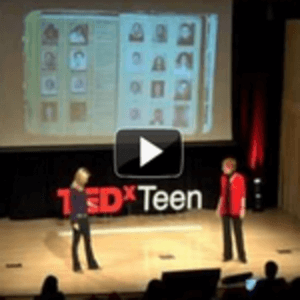Not every teenager sits around, texting endlessly and at all the wrong times, causing their parents to worry about a possible addiction to technology. Some of them give TED talks in their spare time.

How will we talk about feminism? What does it mean to “fail,” and why shouldn’t we fail better? What is love? Why isn’t America investing in young black men? And are the people who create change the silent supporters rather than the vocal leaders? In this curated selection of TEDxTeen Talks, the adolescent version of the adult TED Talks, five teens discuss these ideas and how they collide with their own stories.
Natalie Warne Believes in the Anonymous Extraordinaire
Natalie Warne begins her talk with a powerful reference to a picture of her mom as a 12-year-old girl, staring into the eyes of Dr. Martin Luther King Jr. “When I was younger, I would stand on my tippy toes and stare into that picture,” she says.
Warne is biracial, and experienced racism at an early age. She describes this in her talk as an identity crisis of sorts. As a result, she wanted to get through high school as quickly as possible. When she was 17, she discovered a film called Invisible Children, which is about the tragedy of Joseph Kony’s child soldiers. That’s when she also found her passion, and the power people have to fight for change.
Tavi Gevinson’s Still Figuring It Out
Style blogger Tavi Gevinson’s talk is called “Still Figuring It Out,” but based on her talk alone, it seems like this girl has it mostly figured out. Or at least what there is to know right now.
Gevison is best known for her now four-year-old fashion blog StyleRookie and RookieMag.com, her online style magazine for teenager girls. In her TED talk, she discusses her take on feminism, pop culture, her love of fashion and what makes a powerful female character.
“What makes a strong female character often goes misinterpreted,” says Gevinson. “Instead, you get a two-dimensional superwoman, that maybe has one quality that is played up a lot – like a catwoman type – or she plays up her sexuality which is seen as power. But this is not powerful. Flaws are key.”
She speaks honestly about what it means to be a feminist today, a word that for some reason still at times feels difficult to utter. She reassures young viewers that feminism is “not a rule book,” and that, rather, it’s a “discussion, conversation and a process.”
How Tara Suri & Niha Jain Learned to Fail
Why aren’t there any books on failing and failures? Why is everything about success and succeeding? That’s what Tara Suri and Niha Jain want to know. Sure, there are terms like “epic fail” and the FAIL blog, but in reality, no one wants to talk about failure. Instead, people fear it. They hope it doesn’t happen to them.
“In a culture that’s all about ‘winning,’ some people even blatantly recast their mistakes,” says Jain, as an image of Charlie Sheen flashes across the TEDxTeen PowerPoint screen.
The two girls chart their epic journey through the failure they experienced the previous summer when all they were trying to do was succeed. They wanted to change a community where 85% of women had been forced into prostitution. They had another plan. And it failed, in a good way.
“If we want to be game changers, we have to fail loudly and proudly,” says Suri.
Curtis Kulig Is Obsessed With Love
“Love me, love me, love me,” Kulig tells the TEDx audience. “Say it to the person next to you.” Everything is about love.
Obsession is usually talked about as a bad thing – but for this adolescent, it was his obsession with love that got him here in the first place.
“My obsession has turned into my profession,” he explains.
Perhaps you’ve heard of him. His simple “Love Me” logo can be found across the world, from spray-painted dumpsters to bottoms of skateboards to stickers, on Michael Stars T-shirts and Victoria’s Secret materials. He’s not a graffiti artist or a tagger. He’s a culture maker, a message creator.
“I am writing ‘love me’ till my hands hurt,” he says.
Khadim Diop Knows Frankenstein
Fifteen-year-old Khadim Diop is going to be a star. At age 5, he decided that he wanted to change the world.
His lyrical poetry walks the line between slam and rap, perfectly delivering a single message: “I am the promise of tomorrow,” he says, fierceness in his eyes.
“Am I not worth the fight? I am the future.”
These five teens are delivering just that, coupled with grace, eloquence and attitude. They are our future culture leaders.
“Becoming an adult means leaving the world of your parents and starting to make your way toward the future that you will share with your peers,” writes Alison Gopnik for The Wall Street Journal. “Puberty not only turns on the motivational and emotional system with new force, it also turns it away from the family and toward the world of equals.”

















